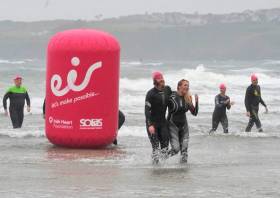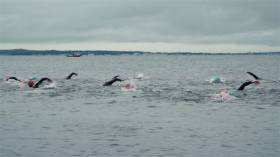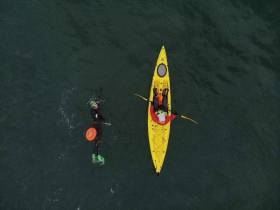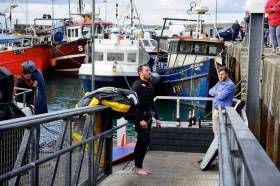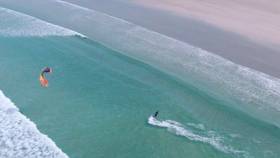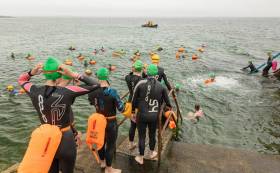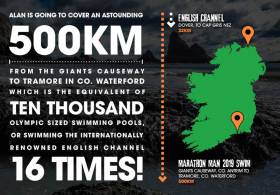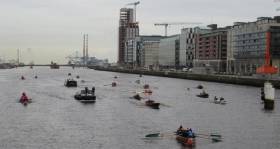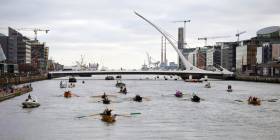Displaying items by tag: Charity
A Donegal octogenarian has set himself the mammoth task of going for an open water swim at as many Irish beaches and piers as possible.
As RTÉ News reports, Paddy Conaghan is living out of a van for the duration of his ‘Ducking & Driving Around Ireland’ charity challenge, which he began at the start of this month.
The 80-year-old from Arranmore is working his way anti-clockwise around the coast of Ireland and most recently has been enjoying the hospitality of Co Kerry’s coastal communities.
What’s more, he’s already raised nearly €50,000 for local counselling service Gemma's Legacy of Hope — and hopes to raise much more before the expected completion of his lap around the island in February.
Follow’s Paddy’s adventures on his Facebook page HERE.
After seven weeks and 500km of open water, ‘Marathon Man’ Alan Corcoran completed his epic swimming challenge from the Causeway Coast to Tramore on Monday morning, 22 July.
Sadly Alan wasn’t able to join supporters in the mass public swim organised to greet his arrival on Sunday, due to poor weather conditions that delated his approach along the Waterford coast.
But with some of those closet to him by his side, he wasted no time early on Monday by taking the first break in the weather at the crack of dawn to swim the final stretch from Ballymacaw to Tramore Strand.
“Four final hours of swimming and I can now proudly say, mission complete,” he wrote on his Facebook page where he’s been charing his adventure.
And Alan is still accepting donations for his chosen charities the Irish Heart Foundation and Solas Cancer Support Centre. See MarathonMan.co for more details.
Annual Galway Bay Swim For Charity Takes Place Tomorrow
Close to 130 hardy souls will take to the waters of Galway Bay tomorrow (Saturday 20 July) for the 14th annual Frances Thornton Memorial Galway Bay Swim.
As previously reported on Afloat.ie, the early sell-out event is one of Ireland’s biggest and longest one-day swims — comprising a 13km course between Aughinish in Co Clare and the Blackrock diving tower in Salthill, just west of Galway city centre.
This year’s swimmers will be hoping to beat last year’s fundraising total of over €100,000 for Cancer Care West.
And among them is Christina Hyland, who writes for the Galway Advertiser about her preparations for the open water swim.
Elsewhere, a charity swim of a different kind is being planned for Belfast Lough next Friday (26 July).
As the Carrick Times reports, a local councillor and five fellow swimmers will take on the challenge of crossing shipping lanes between Grey Point at Helen’s Bay and Carrickfergus Castle — a distance of nearly four nautical miles, or 7km.
‘Marathon Man’ Alan Corcoran has reached Howth and Dublin Bay, 36 days into his 500km open water swimming challenge from the Causeway Coast to Tramore.
As previously reported on Afloat.ie, Alan took on the mammoth task after completing an already ambitious run around the island of Ireland — and becoming the first man to do so — in 2012 tribute to his father, former FAI president Milo Corcoran.
A previous attempt at the long-distance swim in 2017 after his father’s death ended prematurely when his support boat sank, which only made Alan more determined to get it done this time around.
And he surpassed his previous efforts when he crossed the North-South border at Carlingford Lough last week.
While Alan says he’s not as far along as he’d hoped by this stage — due to the typically temperamental conditions around the Irish coast — he’s reminded himself that “it’s a marathon, not a sprint”.
Alan is blogging his adventures on Facebook, charting all the highs and lows of his 80-odd hours of swimming this far — including his first jellyfish sting off the north Co Dublin coast.
And he’s also appealing for swimmers to join him in a mass sea swim event for the final stretch to Tramore later this month — and to raise finds for his chosen charities the Irish Heart Foundation and Solas Cancer Support Centre.
Hero’s Welcome In Ballycotton For Eoghan Quinn Despite Lack Of Wind Foiling His Kitesurf Challenge
There was some disappointment for kitesurfer Eoghan Quinn as his attempt to ride the waves from France to Ireland yesterday (Sunday 30 June) ended prematurely when the wind dropped off Cornwall, just short of the halfway point.
But the 31-year-old, who has Type 1 diabetes and was taking on the challenge to raise funds for and awareness of Diabetes Ireland, arrived in Ballycotton on his support boat yesterday evening to a hero’s welcome.
“A lot of planning went into this but mother nature is the one thing we cannot control, but we achieved what we set out to do which was to raise awareness,” he told RTÉ News.
The route from France to Ireland through the Celtic Sea — dubbed the ‘Kitesurf Road’ — has never before been completed by kite and board.
Quinn had hoped to beat the Cherbourg-Rosslare ferry by crossing in under 16 hours.
Ballycotton welcomes @EoghanQuinn1 pic.twitter.com/lwoL2KWw9U
— Ballycotton (@BallycottonIRE) June 30, 2019
A Waterford man with Type 1 diabetes is currently kitesurfing over 275 miles of open water from France to Ireland today (Sunday 30 June) in aid of a charity supporting people with the disease.
Eoghan Quinn is attempting to race the Cherbourg-Rosslare ferry and cross the waves of the Celtic Sea in under 16 hours to raise funds for of Diabetes Ireland. (See his EverydayHero fundraising page HERE.)
It’s a route that’s never before been completed by a kitesurfer — and Eoghan will have the added complication of managing his blood glucose and insulin levels along the way.
But such challenges are nothing new to the 31-year-old kitesurfing champion, who has previously completed a 6,000km cycle to Gaza and a 1,000km ride from Melbourne to Sydney.
Diabetes Ireland has more on the story, and you can track Eoghan’s progress HERE.
The Frances Thornton Memorial Galway Bay Swim in aid of Cancer Care West returns to the waters of Galway Bay this July.
Now in its 14th year, the now sold-out event on Saturday 20 July will see close to 130 swimmers taking part this year in one of Ireland's biggest and longest one-day swims.
Starting from Aughinish in Co Clare and finishing at Blackrock diving tower in Salthill, where the recent swim ban has just been lifted, the swim is a distance of roughly 13 kilometres — if you swim in a straight line.
This year there will be 69 solo swimmers as well as 65 relay swimmers taking part in teams of two, three and four.
Since the swim began 14 years ago, 740 people have swam the bay and this year again it will be a mixture of swimmers who have completed the swim every year and complete novices.
Last year’s swim raised over €100,000 for Cancer Care West and it’s hoped to beat that target this year.
The monies raised will help fund the expansion of support services for cancer patients, including a counselling service for children and a dedicated gym rehabilitation space for cancer patients.
Safety is a priority for the swim, and each year the event reaches out to the maritime community in the west to support the swim through boat support.
Ciaran Oliver of Galway Bay Boat Tours and Oranmore Maree Coastal Rescue are helping out again this year.
Each swimmer needs a boat to follow and track their swim, so organisers are again this year asking any boat owner to get in contact with the hope they can volunteer their services on the day.
The most suitable boat is a 5m RIB with a 50HP engine or equivalent.
“Ideally we are looking for motor boats, pleasure crafts between five and seven metres, however we are urging people to get in touch and we can then pull together resources from what we have and ensure that this swim is again a safety success,” Ciaran Oliver said.
The Frances Thornton Memorial Galway Bay Swim will take place on Saturday 20 July. Spectators are invited to go down to Blackrock diving tower in Salthill to welcome the swimmers home from noon.
To volunteer or for more details visit the official website and Facebook page, or contact Dave O’Donnell on 087 908 8587.
‘Marathon Man’ To Take On 500km Charity Swimming Challenge From Causeway Coast To Tramore
This summer, Waterford’s ‘marathon man’ will attempt a 500km open water swimming challenge from the Causeway Coast to Tramore to raise funds for stroke and cancer support.
Alan Corcoran made headlines in 2012 when be became the first man to run a lap of the island of Ireland in tribute to his father, former FAI president Milo Corcoran, who suffered a stroke the year before.
After his father’s death from cancer in 2016, Alan embarked on another ambitious undertaking — to swim from the top to the bottom of Ireland.
Alan first attempted the swim in 2017, but came acropper some 200km in when his support boat sank to shy of the border.
Nevertheless, his efforts still raised €13,000 for his chosen charities, and firmed his resolve to take on the challenge again in aid of the Irish Heart Foundation and Solas Cancer Support Centre.
“Losing my dad has been the toughest experience of my life,” says Alan. “Out of the darkness I am determined to grasp any opportunity to create some positives.”
He adds: “The swim is my small way of feeling like I’m taking some meaningful action.”
As Alan prepares to set out from the Giant’s Causeway on Saturday 1 June, he is also seeking a skipper to sail his 32ft Jeanneau Attalia as a support vessel for the swimming challenge. For more details see the Afloat Marine Market HERE.
Mammoth Eight-Hour Rowing Challenge On River Liffey Will Raise Funds For Charities
All In A Row 2018 comes to the River Liffey this Saturday 1 December, challenging teams rowing 40 skiffs, kayaks, canoes and currachs to exceed a 1,000km target in eight hours.
The organisers are hoping to beat last year’s target during the event from St Patrick’s Rowing Club at the Tom Clarke Bridge (formerly the East-Link Bridge) and finishing at the Ha’penny Bridge.
While showcasing the River Liffey as one of Dublin’s best amenities, the challenge also aims to raise funds for water-related charities, namely the RNLI and the Irish Underwater Search and Recovery Unit.
The event will start at 8am this Saturday and at noon all boats will gather in front of the Sean O’Casey footbridge. A wreath-laying ceremony, attended by the Lord Mayor of Dublin Nial Ring, will also take place to commemorate all those who have lost their lives through drowning.
The event remembers particularly the crew of the currach rowed and sailed from the Liffey to Santiago de Compostela and who later lost a valued crew member in Danny Sheehy.
The RNLI will have an Atlantic 85 inshore lifeboat on display for people to view during the day, berthed alongside the Jeanie Johnston replica famine ship.
The event is also being used as an opportunity to engage with inner city Dublin schools whose pupils have been invited to the Dublin Docklands offices to learn about water safety through the RNLI’s Respect the Water campaign, and how they can volunteer in their communities to help save lives at sea. The city’s Sea Scouts will also be participating in the event.
Many Dublin rowing clubs have their home on the River Liffey and are a regular sight on the water. At the port end of the river is St Patrick’s Rowing Club, Stella Maris Rowing Club, East Wall Water Sports Group and Poolbeg Yacht and Boat Club.
Ringsend Basin is home to the Plurabelle Paddlers (Dragon boats) and the Dublin Viking Dragon boat club. At the other end of the city, beyond Heuston Station, there are many river rowing clubs and kayaking clubs, including Phoenix Rowing Club.
This Saturday the many boating clubs of the Liffey will be joined by rowing clubs from other parts of Ireland.
“Everyone knows the River Liffey but most people don’t know how far it stretches and how many rowing groups use it regularly,” organisers said.
“There is a vibrant boating community on the River Liffey and these clubs regard it as the living artery of the city and one of Dublin’s great and undervalued amenities.
“After the beautiful summer we’ve had, we know that people are drawn to the water, whether on the coast or inland to enjoy different water sports.
“The Liffey is an undervalued and underused resource that is right under people’s noses and we want to encourage them to use it and to use it safely. From school children right up to seasoned rowers, this is a great opportunity to draw people down to the Liffey and learn about water safety and the fun activities they can do on the water all year round.”
Competitors are asked to raise sponsorship for the event, and for those not competing and supporters, there is a GoFundMe page for donations.
Charities Benefit as Flotilla Takes to Liffey This Saturday
#Rowing: The second annual All-in-a-Row charity event on the River Liffey will be held this Saturday, December 9th. Rowers, kayakers and canoeists will take part in a row or paddle to raise money for the RNLI and The Irish Underwater Search and Recovery Unit. The course runs from the Tom Clarke Bridge (formerly the East Link) to Grattan Bridge, and the event will start at 8 am and end at 3.30. There will be a base at St Patrick’s Rowing Club.
There is a link for those who wish to donate on allinarow.ie.
The RNLI provides a rescue service at sea, along with education and supervision on beaches. It sets out to influence other organisations, policy-makers and regulators, throughout Ireland, England, Scotland and Wales. The RNLI provides a 24-hour search and rescue service to 100 nautical miles out from the coast of Ireland and the UK.
Ninety five per cent of RNLI people are volunteers. RNLI crews and lifeguards have saved over 142,000 lives since the institution was formed in 1824. They have 46 Lifeboat stations around the Republic of Ireland and Northern Ireland and four inland lifeboat stations, at Lough Derg, Lough Ree, Lough Erne and Strangford Lough.
RNLI statistics (2016): 1,136 launches; 1,649 people rescued; 37 lives saved; on average 28 people rescued per week.
The Irish Underwater Search and Recovery Unit (IUSRU) is a charity registered in the Republic of Ireland.
When persons go missing in rivers, canals, lakes or around our coasts they require specialist equipment and personnel to bring them home. The IUSRU is made up of a dedicated team of volunteers who search for missing people underwater and recover them so they can be given a dignified resting place.
The IUSRU was formed in January 2012 to provide a professional, dedicated and highly trained service that could carry out the task of recovering missing persons with compassion and sensitivity.
In 2014 there were 114 recorded deaths through drowning in Ireland.



























